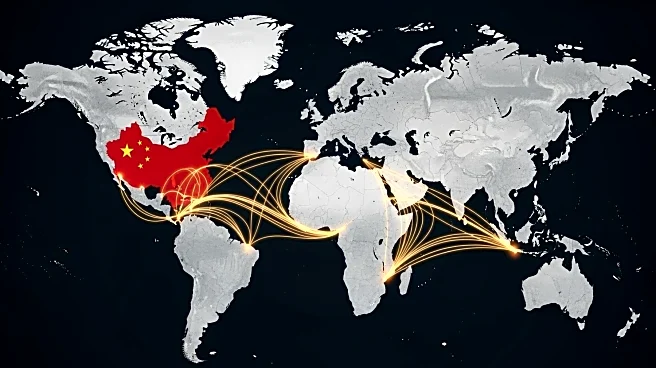What's Happening?
China's new reciprocal port fee program, launched on October 14, is causing immediate impacts on shipping routes as carriers like Maersk and Hapag-Lloyd adjust their operations. The program imposes a $56
per net ton fee on U.S. ships, leading Maersk to alter its TP7 rotation and Hapag-Lloyd to divert its Potomac Express vessel to Busan, South Korea, bypassing Ningbo, China. Other vessels, such as Matson's Manukai, have incurred significant fees, with estimates reaching $630,000. China's Ministry of Commerce has expressed strong dissatisfaction with U.S. port fees and restrictive measures, urging the U.S. to correct its actions and engage in trade talks.
Why It's Important?
The introduction of China's port fee program is a significant development in the ongoing trade tensions between the U.S. and China. The fees are impacting shipping logistics, potentially increasing costs for carriers and affecting global supply chains. As carriers adjust routes to avoid fees, there may be disruptions in the delivery of goods, influencing trade dynamics and economic relations between the two countries. The situation underscores the complexities of international trade policies and their direct impact on industries reliant on maritime logistics.
What's Next?
In response to China's port fee program, shipping companies may continue to alter routes and strategies to mitigate costs. The potential for increased freight rates could affect global trade prices and consumer costs. As trade negotiations between the U.S. and China progress, stakeholders will be closely monitoring developments for any changes in policy or fee structures. The situation may prompt further diplomatic discussions aimed at resolving trade disputes and stabilizing economic relations.
Beyond the Headlines
The port fee program highlights broader geopolitical tensions and the strategic use of trade policies as leverage in international relations. The fees could lead to long-term shifts in shipping practices and influence the competitive landscape of global maritime logistics. Additionally, the situation raises ethical considerations regarding the use of economic measures in political disputes, potentially affecting international cooperation and trade agreements.










